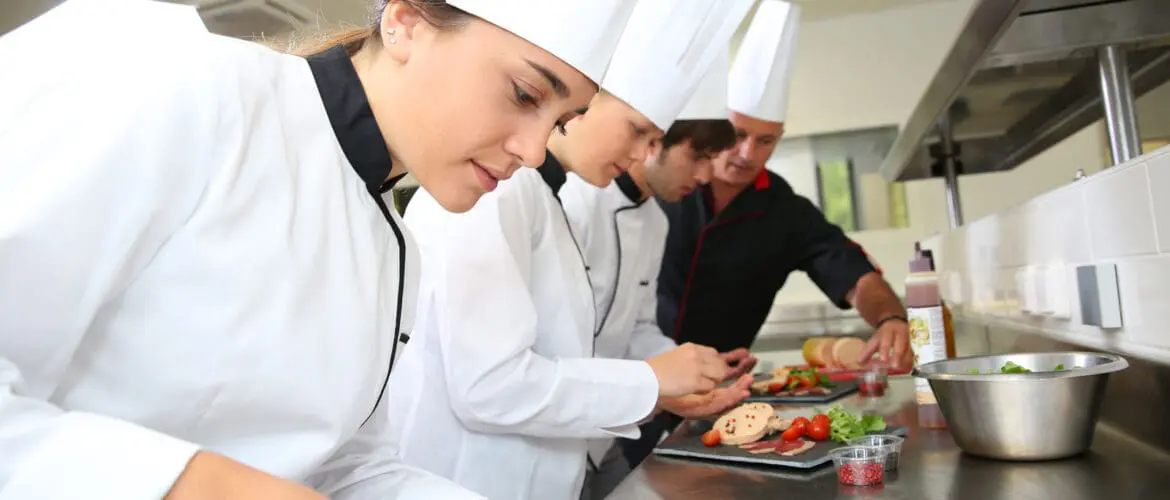Study Abroad
BECOMING A CHEF IN GERMANY – A MAJOR THAT NEVER OUT-DATED
- 18/10/2023
- Posted by: New Life
- Category: Vocational Training in Germany

Due to its central location in Europe, German cuisine is influenced by various countries around the world. Moreover, Germany welcomes thousands of tourists each year, leading to a high demand for professional chefs in hotels and restaurants across the country. If you are considering pursuing a culinary vocational program in Germany, check out the following information from NEW LIFE.
1. Daily tasks of a professional chef in Germany
When you choose to study culinary arts in Germany and become a professional chef, your daily tasks will include:

- Creating seasonal menus tailored to customer preferences.
- Ordering ingredients and food products for meal preparation and storing them properly.
- Skillfully using kitchen equipment to prepare dishes.
- Presenting and garnishing dishes in an appealing, elegant, and visually pleasing manner.
2. Guiding and supervising kitchen staff
- Cleaning and tidying up the workspace, packing ingredients, and disposing of waste according to regulations.
- Inspecting the stock of stored materials.
- Learning to differentiate and preserve fine wines.
In addition to preparing German cuisine, a professional chef must also be skilled in cooking signature European dishes such as Italian pasta, steak, and other international specialties from Asia to Europe, including Indian curry and distinctive dishes from Thailand, Japan, and Korea.

3. Admission requirements for studying Chef in Germany
- Male and female applicants aged 18 to 28.
- Must have graduated from high school in Vietnam.
- Good health, free from skin diseases, gastrointestinal issues, and infectious diseases such as hepatitis B and C.
- No criminal record.
- Must have a B1 German language certificate in Vietnam.
- Required height: at least 1.65 m.
- Must possess a clean, meticulous, creative, and quick personality.
4. Course route for Chef Training Program in Germany
Similar to the nursing program in Germany, the culinary training will alternate between theoretical learning and practical application.
First-year Training
Students studying culinary arts in Germany will practice customer interaction, proper use of kitchen equipment, inventory management, and kitchen organization. Theoretical subjects in the first year include:
- Preparation, cooking, and serving dishes according to recipes.
- Understanding the basics of food safety regulations and the importance of environmental protection.
- Learning safety protocols while working in the kitchen.
- Menu planning, advising customers, and billing.
- Proper food storage and order checking.
Second-year Training
- Study of plant-based food ingredients such as fruits, vegetables, and grains.
- Students will learn to prepare and preserve plant-based ingredients, understanding their nutritional value to create vegetarian or vegan dishes.
- Buffet preparation: methods for cooking hot and cold dishes, as well as appealing presentation and decoration.
- Preparing desserts and cooking meat and seafood dishes.
Third-year Training
- Sales psychology: planning and consulting for clients wanting to organize events.
- Selecting dishes and decorating tables and dining areas according to specific themes. Designing menus that match available ingredients for different occasions while considering product costs.
- Exploring culinary cultures from various regions of Germany and around the world. Researching and creating recipes that align with current trends.
5. Salary during Chef Training in Germany
Throughout the vocational training in Germany, students will receive a salary ranging from 600 to 900 euros per month over the three-year program.
After graduating from the culinary program in Germany, a professional chef’s salary ranges from 2,000 to 4,000 euros per month, which can be higher depending on the restaurant (while the salary for nursing training ranges from 2,700 to 3,200 euros per month, potentially reaching up to 4,000 euros).

6. Job opportunities and Career prospects for Chef Training in Germany
After graduation, students have the opportunity to work in international restaurant and hotel chains, as well as on luxury cruise ships. Additionally, graduates can open their own eateries or restaurants, although this requires significant capital and high competence.
Chefs who graduate can apply for long-term residency in Germany after five years of employment, with the opportunity to become German citizens after eight years of residency. However, compared to the nursing profession, the minimum annual salary for chefs to qualify for residency in Germany is relatively higher. This is due to the current shortage of healthcare workers in Germany, making it easier and quicker for students in that field to obtain residency compared to other professions like culinary arts.

